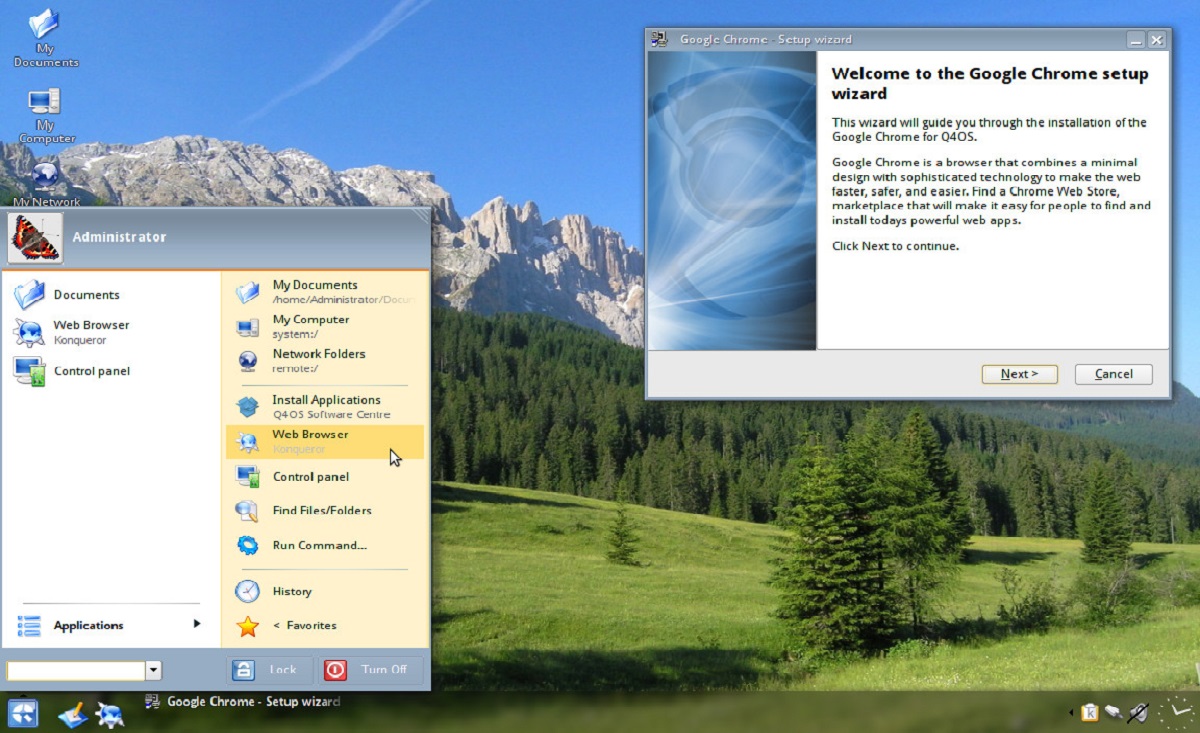
Q4OS is a Linux distribution German based on open source Debian with a light interface and friendly to the novice user, offering a desktop environment called Trinity, also known as TDE Trinity Desktop Environment, similar to Windows XP and Windows 7 directly. It focuses on long-term stability, safety, speed, and reliability.
This Linux distribution, along with others like Chalet OS3 and Zorin OS, has an approach specifically geared towards users familiar with Windows, with an appearance previously configured to be similar to that of that Microsoft Operating System.
Like Linux Lite does, Q4OS also allows you to reuse those old computers, abandoned somewhere due to hardware limitations, on which Windows XP was previously running, that is, low-resource computers, on which the most modern versions of Windows no longer work.
Given this need, Q4OS was born, even though it was created long before Microsoft announced the end of support for Windows XP.
The distribution stands out for including several proprietary applications, including the 'Desktop profiler' for quick installation of thematic software packages, the 'Configuration Utility' to install third party applications, the 'Welcome screen' to simplify the initial configuration and the scripts to install alternative environments LXQT, Xfce and LXDE.
About the new version of Q4OS 3.10
Few days ago Q4OS developers announced the release of the new version Q4OS 3.10 which comes with the base Debian 10.2 Buster packages and along with the new KDE Plasma 5 and Trinity desktop features.
In this new version, work was done to guarantee the independence of the Plasma and Trinity desks as the Q4OS Plasm environment is no longer tied to Trinity components, significantly reducing the size of the installation media with the Plasma desktop. With that now the packages can be found as separate dependencies «q4os-desktop-plasma»Or«q4os-desktop-trinity«.
While for LXQT the developers mention that they worked to cover the dependencies of the environment in the distribution.
Also, it is mentioned in the announcement of eThis new version a utility has been added to send hardware reports to the Live build.
It is also mentioned that for the Trinity desktop environment the utility to scale the screen has been improved, In addition, the Plasma Debonaire design theme was refined.
For Raspberry Pi distro version it stands out that Raspbian10, Raspbian11, Bullseye repositories were added to the installer.
In the calamari installer, in the display manager module now verifies the presence of TDM before solving
For the optimization of the system, the cleaning and elimination of unused files was carried out, and the first login script was also corrected.
Download and install Q4OS 3.10
If you have been interested in this distribution you can go to the official website of the project y in your download section you can get the system image.
In the download section you can find the links to download the desktop version with its different flavors (Plasma or Trinity)
As for the the requirements for the optimal functioning of the distribution we need at least a processor with 32-bit architecture Intel Pentium III at 500 Mhz, AMD-K6 III at 500 Mhz or a higher processor, in terms of RAM, 256 MB or more is enough and we require a space on a hard disk with at least 5 GB of storage space and a VGA resolution of 1024X768.
In the case of those who are users of a Raspberry Pi they can also find the system image for your device, even though This image is built on the Scorpion version of Q4OS (2.7) so it is not built on the current desktop version.
Finally if you want to know more about this new version you can consult the following link.